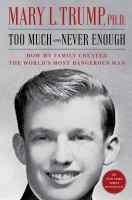

"Since Mary (Trump's mother) was emotionally and physically absent due to her injuries, Fred (Trump's father) became, by default, the only available parent, but it would be a mistake to refer to him as a caregiver. He firmly believed that dealing with young children was not his job and kept to his twelve-hour-a-day, six-day-a-week job at Trump Management, as if his children could look after themselves. . . Again, Donald and (younger brother) Robert in particular would have been in the most precarious position vis-à-vis Fred's lack of interest. All behavior exhibited by infants and toddlers is a form of attachment behavior, which seeks a positive, comforting response from the caregiver- a smile to elicit a smile, tears to prompt a hug. Even under normal circumstances, Fred would have considered any expressions of that kind an annoyance, but Donald and Robert were likely even needier because the missed their mother and were actively distressed by her absence. The greater their distress, however, the more Fred rebuffed them. He did not like to have demands made of him, and the annoyance provoked by his children's neediness set up a dangerous tension in the Trump household: by engaging in behaviors that were biologically designed to trigger soothing, comforting responses from their parents, the little boys instead provoked their father's anger or indifference when they were most vulnerable. For Donald and Robert, 'needing' became equated with humiliation, despair, and hopelessness. . . Fred's parenting style actually exacerbated the negative effects of Mary's absence. As a result of it, his children were isolated not just from the rest of the world but from one another. From then on it would become increasingly difficult for the siblings to find solidarity with other human beings, which is one of the reasons Freddy's (Mary L.'s father) brothers and sisters ultimately failed him; standing up for him, even helping him, would have risked their father's wrath. . . Abuse can be quiet and insidious just as often as, or even more often than, it is loud and violent. As far as I know, my grandfather wasn't a physically violent man or even a particularly angry one. He didn't have to be; he expected to get what he wanted and almost always did. It wasn't his ability to fix his oldest son that infuriated him, it was the fact that Freddy simply wasn't what he wanted him to be. Fred dismantled his oldest son by devaluing and degrading every aspect of his personality and his natural abilities until all that was left was self-recrimination and a desperate need to please a man who had no use for him. The only reason Donald escaped the same fate is that his personality served his father's purpose. That's what sociopaths do: they co-opt others and use them toward their own ends- ruthlessly and efficiently, with no tolerance for dissent or resistance. Fred destroyed Donald, too, but not by snuffing him out as he did Freddy; instead he short-circuited Donald's ability to develop and experience the entire spectrum of human emotion."
"Sometime in the afternoon of Saturday, September 26, 1981, one of my grandparents called an ambulance. I didn't know it then, but my father had been critically ill for three weeks. It was the first time anybody called for medical help. My grandmother had been a regular at Jamaica Hospital and Booth Memorial Hospital and Medical Center. My dad, too, had been admitted to Jamaica a few times. All of my grandparents' children had been born there, so the family had a long-standing relationship with the staff and administration. My grandparents had donated millions of dollars to Jamaica in particular, and in 1975 the Trump Pavilion for Nursing and Rehabilitation had been named for my grandmother. . . A single phone call would have guaranteed the best treatment for their son at either facility. No call was made. The ambulance took my father to the Queens Hospital Center in Jamaica. No one went with him. After the ambulance left, my grandparents called their other four children, but only Donald and Elizabeth could be reached. By the time they arrived in the late afternoon, the information coming from the hospital made it clear that my father's situation was grave. Still nobody went. Donald called my mother to let her know what was going on but kept getting a busy signal. He got in touch with our superintendent and told him to buzz her on the intercom. Mom immediately called the House. 'The doctors think Freddy probably won't make it, Linda,' Donald told her. My mother (divorced to Freddy) had had no idea that Dad was even sick. 'Would it be all right if I came to the House so I can be there if there's any news?' She didn't want to be alone. When my mother arrived a short time later, my grandparents were sitting alone by the phone in the library; Donald and Elizabeth had gone to the movies. While Mom sat with my grandparents, nobody said much. A couple hours later, Donald and Elizabeth returned. When they were told there was no news, Donald left, and Elizabeth, nearing forty, made a cup of tea and went upstairs to her room. As my mother was getting ready to leave, the phone rang. It was the hospital. Dad had been pronounced dead at 9:20 p.m. He was forty-two."
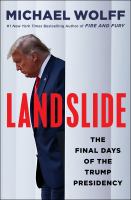

“Trump had, starting weeks before, continued to nod to the event in a series of tweets: ‘JANUARY SIXTH, SEE YOU IN DC!’ But this was not a White House event. Even if they had wanted to, there was no one in these final days in the White House capable of organizing a major rally or even coordinating with anyone who was. . . The Washington Post outlined in quite extensive detail what was going to happen on January 6, although this was played as a local story, and you had to scroll pretty far down to find it. There would be four different rallies on the sixth, the Post reported, each with different organizers, each set to protest the election results and to demand an overturn of the Electoral College vote. Said the Post: ‘. . . online forums and encrypted chat messages among the far-right groups indicate a number of demonstrators might be planning more than chanting and waving signs. Threats of violence, ploys to smuggle guns into the District and calls to set up an ‘armed encampment’ on the Mall have proliferated in online chats about the Jan. 6 day of protest. The Proud Boys, members of armed right-wing groups, conspiracy theorists and white supremacists have pledged to attend.’ For Trump, and for everybody who had grown used to him, this was just more of the same - here was the impassioned, quirky, voluble, ‘a bit too crazy’, great unwashed group that had filled his stadiums. For Trump, these people were the background to his main event. They were props for him. They were not the story. He was the story. The main event, his main event, even if only in his imagination, was for Biden’s electors not to be certified and to instead be replaced by Trump electors; or, at least, for Biden’s electors to be sent back to their respective state legislators.”
“As sure as the sun would rise, Congress would certify Joe Biden’s Electoral College victory. So, for Trump and Giuliani, this was either an attention-grabbing last hurrah — both men would of course do anything for attention — or part of a kind of elaborate charade of saving face and creating a historic political martyrdom. Or— and this was the ‘Emperor’s New Clothes’ situation that most political professionals were steadfastly trying not to acknowledge—it was mental derangement of a kind and at an intensity never before known at the highest level of the U.S. government. . . This derangement was certainly encouraged by the various members of Congress and the Senate who were saying they would participate in the melodrama—for their own attention-getting or symbolic reasons.”
"Trump is a demonstrably cheap date on the corruption front, apparently hoping to make it up on volume. You don't think that foreign governments, international criminals, and expat oligarchs from around the globe buy blocks of Trump condos and fill wildly overpriced D.C. hotel rooms and event spaces every night just because they read a Yelp review praising the linens and spa services, do you? . . . Donald Trump is sending a signal, loud and clear, that he's for sale, satisfaction guaranteed. Far from the Greatest Negotiator Ever, he's the easiest lay in White House history. . . . In 2019, sanctioned Russian oligarch and Putin bestie Oleg Deripaska mysteriously announced that his firm, Rusal will build a new aluminum plant in the United States, in Mitch McConnell's home oblast of Kentuckistan. It struck one columnist and some Senate Democrats as a remarkable coincidence that McConnell blocked bipartisan efforts to stymie the Russian election interference in the 2020 election shortly thereafter. Expect many, many more examples of Trump donors being handed the keys to the kingdom and free rein over the various satrapies in which they take a monetary interest. As a note, a coal lobbyist now runs the Environmental Protection Agency, a pharma lobbyist runs the Department of Health and Human Services, and for a time, a defense lobbyist ran the Department of Defense."
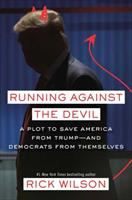

Landslide by Michael Wolff - 2021
Running Against the Devil by Rick Wilson - 2020
"If Trump wins reelection, freedom, opportunity, and equality will no longer be the normative social force shaping the next generation of American children. They won't be taught that this is a country of marvelous provenance and a glorious future. Instead, they'll be steeped in the essence of Trumpism: nativist, negative, and fundamentally pessimistic. The Other is the enemy. They'll learn the long-discredited notion that ethnicity defines character. The sort of stereotyping that met the nineteenth- and twentieth- century immigration waves -- drunken Irishmen, dour Germans, lazy Spaniards, fiery Italians, and inscrutable Chinese -- are back with a vengeance under Trump. It's one step short of the Department of Homeland Security having a Phrenology Division to screen migrants. . . What (children) will learn, every day, is that threats, intimidation, serial deceptions, bullying, bluster, and bull**** are a full substitute for character. They will learn from the master of cons that after he took the highest office in the land with a series of brazen deceptions and help from hostile governments, he faced absolutely no consequences. . . Donald Trump's legacy will be a generation of young people comfortable with casual cruelty, rampant dishonesty, and revenge as pillars of our politics."
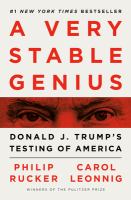

"Secretary of Defense Jim Mattis, Director of the National Economic Council Gary Cohn, and Secretary of State Rex Tillerson had grown alarmed over the first six months of the Trump administration by gaping holes in the president's knowledge of history and of the alliances forged in the wake of World War II that served as the foundation of America's strength in the world. Trump had unnerved trusted friends by dismissing existing relations with Western democracies as worthless, including by questioning the value of NATO, while cultivating friendlier ones with Russian and other authoritarian regimes. He wanted to tear up trade deals to squeeze more out of partners. And he advocated withdrawing troops not only from active theaters like Afghanistan but also from strategic outposts like South Korea, where U.S. forces were helping keep the peace, complaining that the military presence around the world was a waste of billions of dollars. . . . 'I wouldn't go to war with you people,' Trump told the assembled brass. Addressing the room, the commander of chief barked, 'You're a bunch of dopes and babies.' For a president known for verbiage he euphemistically called 'locker room talk,' this was the gravest insult he could have delivered to these people, in this sacred space. The flag officers in the room were shocked. Some staff began looking down at their papers, rearranging folders, almost wishing themselves out of the room. A few considered walking out. They tried not to reveal the revulsion on their faces, but questions raced through their minds. 'How does the commander in chief say that?' one thought. 'What would our worst adversaries think if they knew he said this?' This was a president who had been labeled a 'draft dodger' for avoiding service in the Vietnam War under questionable circumstances. Trump was a young man born of privilege and in seemingly perfect health: six feet two inches with a muscular build and a flawless medical record. He played several sports, including football. Then, in 1968 at age twenty-two, he obtained a diagnosis of bone spurs in his heels that exempted him from military service just as the United States was drafting men his age to fulfill massive troop deployments to Vietnam. . . Others at the table noticed Trump's stream of venom had taken an emotional toll. So many people had gone to war and risked their lives for their country, and now they were being dressed down by a president who had not. . . (Rex Tillerson)'s voice broke into Trump's tirade, this one about trying to make money off U.S. troops. 'No, that's just wrong,' the secretary of state said, 'Mr. President, you're totally wrong. None of that is true.' Tillerson's father and great-uncle had both been combat veterans, and he was deeply proud of their service. 'The men and women who put on a uniform don't do it to become soldiers of fortune,' Tillerson said. 'That's not why they put on a uniform and go out and die. . . They do it to protect our freedom.'"
A Very Stable Genius by Philip Rucker -2020
"In the spring of 2017, as aides gathered in the Oval Office one day to brief Trump on upcoming meetings with foreign leaders, they made a passing reference to some foreign government officials who were under scrutiny for corruption, for taking bribes. Trump perked up at the mention of bribes and got rather agitated. He told (Secretary of State Rex) Tillerson he wanted him to help rid of the Foreign Corrupt Practices Act. 'It's just so unfair that America companies aren't allowed to pay bribes to get business overseas,' Trump told the group. 'We're going to change that.' Looking at Tillerson, Trump said, 'I need you to get rid of that law,' as if the Secretary of the State had the power to magically repeal an act of Congress. The business developer turned president was angry about the FCPA ostensibly because it restricted his industry buddies or his own company's executives for paying off foreign government in faraway lands."
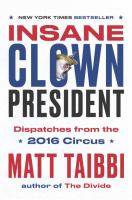

“In Greenville, Donald ‘The Front-Runner’ Trump started off the debate by jumping on his favorite wrestling foil, Prince Dinkley McBirthright, a.k.a. Jeb Bush. He never missed a chance to rip him for being a ‘low-energy,’ ‘stiff’ and ‘dumb as a rock’ weenie who lets his Mexican wife push him around. But if you watch Trump long enough, it starts to seem gratuitous. Trump’s basic argument is the same one every successful authoritarian movement in recent Western history has made: that the regular guy has been screwed by a conspiracy of incestuous elites. The Bushes are half that conspiratorial picture, fronts for a Republican Party establishment and whose sum total of accomplishments, dating back nearly 30 years, are two failed presidencies, the sweeping loss of manufacturing jobs, and a pair of pitiable Middle Eastern military adventures-the second one achieving nothing but dead American kids and Junior’s re-election. Trump picked on Jeb because Jeb is a symbol. The Bushes are a dissolute monarchy, down to offering their last genetic screw-up to the throne. Jeb took the high road for most of the past calendar year, but Trump used his gentlemanly dignity against him. What Trump understands better than his opponents is that NASCAR America, WWE America, always loves seeing the preening self-proclaimed good guy get whacked with a chair.”
Insane Clown President by Matt Taibbi - 2017
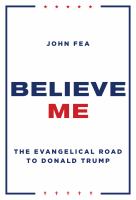

Dark Towers by David Enrich - 2020
". . . the core beliefs of the prosperity gospel fit well with Trump's personal creed of success, wealth, and ambition. Much has been made of Trump's experiences in New York's Marble Street Collegiate Church, where, as a child and young adult, he heard uplifting and optimistic sermons from Norman Vincent Peale, the author of The Power of Positive Thinking. As Kate Bowler's study makes clear, Peale's blend of Christianity, self-esteem, and popular psychology played an important role in the rise of the prosperity gospel. To put it in a different way, it is very unlikely that Donald Trump would be attracted to a form of Christianity that emphasized sin, self-sacrifice, suffering, or anything else that might make demands on his life or prevent him from a pursuit of success as defined by his notion of the American dream."
"At first, conservative evangelicals did not know how to respond to Trump's indiscretions. How could they support his policy proposals and ignore his serious character flaws? To do so would be to go back on much of what they had learned in church - and to undermine their own arguments that Bill Clinton's character flaws had disqualified him from fitness as president. The only way to get around Trump's flaws was to somehow Christianize him. Paula White claimed that she had led Trump to accept Jesus Christ as his savior. Jerry Falwell Jr. said that Trump's moral life had changed since he had become a born-again Christian. James Dobson told his followers to be patient with Trump, whom he declared to be a 'baby Christian.' The kind of forgiveness and understanding that was never given to Bill Clinton was now available in seemingly endless supply to Donald Trump. . . Ralph Reed, who in 1998 said, 'Character matters, and the American people are hungry for that message,' quickly dismissed Trump's words (from the Access Hollywood tape) about grabbing women's genitals and redirected the conversation to corruption in the Hillary Clinton campaign. Franklin Graham responded in a similar fashion, condemning Trump's words and then turning attention to the 'godless, progressive agenda of Barack Obama and Hillary Clinton.' The playbook was clear on this point: character simply didn't matter as much as the opportunity to seize a seat on the Supreme Court."
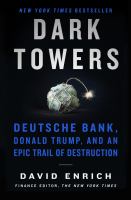

Believe Me by John Fea - 2018
“In 2003, another arm of Deutsche, focused on helping companies raise money by selling stocks and bonds to investors, agreed to work with Trump. The point man on this part of the relationship was Richard Byrne — another Merrill veteran who had been involved with the Taj Mahal debacle. . . Byrne knew this would be another uphill battle; not only had Trump defaulted in the past, but he also had recently been taunting investors that he might stop paying back other outstanding bonds. (Head of Deutsche’s American operations Seth) Waugh didn’t warn Byrne about the recently rejected $500 million loan, and Byrne organized a “road show” for Trump to meet with and try to win over big institutional investors. . . The salesmen worked the phones, cast a wider net for more clients, and managed to sell an impressive $485 million of junk bonds (albeit at a high interest rate that reflected investors’ fears that Trump might default). . . The following year, with his casinos on the rocks, Trump’s company stopped paying interest on the bonds and filed for bankruptcy protection. . . Deutsche’s clients, the ones who had recently bought the junk bonds, suffered painful losses. Going forward, Trump would be off-limits for Byrne’s division. The excommunication, however, didn’t apply to the whole bank. Trump soon went back to Justin Kennedy’s commercial real estate group, seeking yet another enormous loan. This one was to build a ninety-two-story skyscraper in Chicago, which Trump planned to name the Trump International Hotel & Tower. It was going to be one of the tallest buildings in America, glittering riverfront high-rise that included a hotel, spa, restaurants, and nearly 500 condominium units. . . Just as Waugh hadn’t warned Byrne about the rejected Trump loan, now Byrne didn’t warn Kennedy’s crew about the bank’s recent bad Trump experience. (‘We just looked the other way,’ explains an executive in Byrne’s division. ‘That was the Deutsche Bank culture.’) Even so, the Chicago loan had all the hallmarks of trouble. Not only Trump defaulted over and over again, but before extending another loan, Deutsche conducted an informal audit of Trump’s finances. He had declared to the bank he was worth $3 billion. But when Deutsche crunched the numbers that his accountants had compiled, they concluded that the real number was $788 million. In other words, Trump had been saying his net worth was almost four times larger than it really was. For most banks, this would have been the final straw; how could you trust a guy to repay a huge loan if he was lying about how much money he had?”
“Moreover Trump’s constant mocking violations of modern cultural taboos, his jokes about Megyn Kelly’s ‘wherever’ and impersonations of disabled Serge Kovaleski and his rants about Carly Fiorina’s face and Hillary Clinton’s ‘massive’ hair, all line up with the ethos of the alt-righters. These ‘dangerously bright’ people think their Internet trolling is hilarious and ideologically justified. They actually think about this, consciously, as a strategy, which is another reason to think they got incredibly lucky when the Republican nominee turned out to be Trump, a man whose trolling is reflexive and pathological, anything but thought out."
“The Trump administration was rapidly relaxing government regulations designed to hem in Wall Street. The Consumer Financial Protection Bureau was neutered. Joseph Otting, who had previously worked for Steven Mnuchin, was installed atop the Office of Comptroller of the Currency, a powerful federal regulator, and promptly loosened the reins on the country’s biggest banks. . . At the very end of 2017, the Labor Department disclosed in the Federal Register that it was cutting a break to Deutsche and four other banks that had admitted to criminal conduct in their manipulation of interest rates. Under federal law, companies that are convicted of violating securities laws aren’t allowed to manage employees’ retirement plans unless they get a waiver from the Labor Department. Now, in a manner of that seemed crafted to minimize public attention, the Trump administration granted multiyear waivers. This was all good news in Frankfurt, but the Justice Department’s investigation into Deutsche laundering money for Putin’s associates via the mirror trades still loomed. (Deutsche’s previous civil settlements with American and British regulators didn’t affect the criminal investigation). In the final months of the Obama administration, all signs had pointed to charges soon being filed against bank employees and probably the bank itself. At the very least, a multibillion-dollar financial penalty looked all but certain. Something curious, however, had happened as soon as Trump took the oath of office. The investigation had gone silent.”


True Crimes and Misdemeanors by Jeffrey Toobin - 2020
"(White House Counsel Pat Cipollone's) letter then went on to spell out the administration's grievances with the impeachment process then under way in the House even though that process was substantially similar to the ones used in 1974 and 1998. In what became a frequent Republican talking point, Cipollone accused Democrats of attempting to 'reverse the election of 2016.' This was true, in a way, because impeachment, if followed by conviction in the Senate, does overturn the will of the voters in the previous election. But that's the purpose of the impeachment provision in the Constitution - as an extraordinary remedy to remove an unfit president. But perhaps the most astonishing part of the letter dealt with the substance of the allegations against Trump, even though the House had not yet spelled out articles of impeachment. Cipollone said Trump would not cooperate with the impeachment investigation because he did nothing impeachable. He wrote that the record 'clearly established that the call (with Ukrainian President Zelensky) was completely appropriate, that the President did nothing wrong, and that there is no basis for an impeachment inquiry.' This, of course, was like the defendant in a trial concluding that he was not guilty. It wasn't surprising that a defendant would feel this way, but it was not his judgment to make. The entire reason Congress was collecting evidence was to establish a basis for the members to reach a verdict. . . But before Cipollone's letter, no president had ever issued a blanket refusal to cooperate at all with a congressional investigation, especially one relating to impeachment, which is a core prerogative of the legislative branch. . . Like his release of the July 25 call record, Cipollone's letter of October 8 represented a catastrophically bad piece of lawyering. It was clear at this point, the House was going to impeach Trump for his behavior with regard to Ukraine. But Cipollone's letter guaranteed that there would be an additional article of impeachment for contempt of Congress."
"(Ambassador to the European Union) Gordon Sondland . . . was euphoric that the long-gestating phone call between Trump and (Ukraine President) Zelensky had finally taken place. Sondland happened to be in Kyiv on the day after the call, and decided to host three staffers from the American embassy at a celebratory lunch. . . The meal took a surreal turn when Sondland, apparently trying to show off to the group, placed a phone call to the president of the United States, who promptly came on the line. Trump's booming voice was so loud that Sondland winced a couple of times, and he held the device a little away from his ear. This allowed the staffers to eavesdrop. . . . The conversation turned to the real purpose of Sondland's call - to hear the president's take on his conversation with Zelensky the previous day. Sondland told Trump that the Ukrainian president 'loves your ass.' Trump then said, 'So he's going to do the investigation?' Sondland reassured Trump: 'He's going to do it. He'll do anything you ask him to.' The moments that followed this phone call were among the most revealing of the entire U.S.-Ukraine saga. The staffers were understandably agog to be privy to such a conversation, more for the content of the call than for the casual vulgarity. These career Foreign Service officers had, of course, devoted their lives to advancing American Foreign policy, and in Kyiv their assignment was to assist a struggling democracy survive in an especially dangerous corner of the world. But here they had a vivid demonstration of their president. David Holmes testified that after Sondland hung up,' I then took the opportunity to ask Ambassador Sondland if it was true that the President did not give a sh** about Ukraine. Ambassador Sondland agreed that the President did not give a sh** about Ukraine. 'I asked why not, and Ambassador Sondland stated, the President only cares about 'big stuff,' Holmes continued. I noted that there was 'big stuff' going on in the Ukraine, like a war with Russia. And Ambassador Sondland replied that he meant 'big stuff' that benefits the President, like the Biden investigation that Trump's personal attorney Rudy Giuliani was pushing. Without apology or explanation, Sondland gave Holmes an accurate distillation of Trump's motivation and character. In personal and political terms, Trump was incapable of empathy. Dirt on his political opponents was 'big stuff'; the American national interest, as well as the lives of Ukrainians at war, was not.' . . .Trump used the power and purse of the United States to exploit Ukraine for his personal political gain."